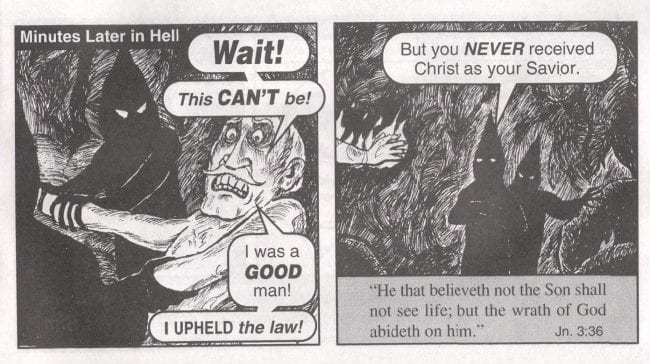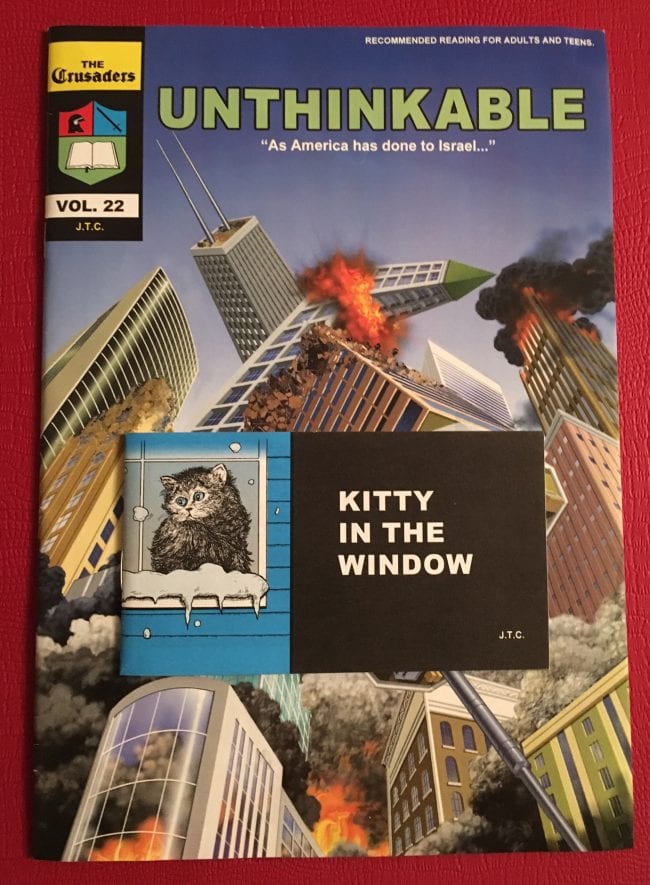
Jack Thomas Chick, the prolific writer, artist, and publisher of religious literature, most notably an extensive line of small cartoon tracts, died in his sleep on Sunday, October 23, 2016. He was 92. No cause of death has been determined at the time of this writing.
Chick was born in Los Angeles on April 13, 1924. Though characterized frequently as private and interview-shy, assorted biographical statements collated by Robert B. Fowler in The World of Chick (Last Gasp, 2001) indicate that Chick studied stagework and direction in school, notably receiving an acting scholarship with the Pasadena Playhouse College of Theatre Arts before service in World War II brought him to New Guinea and Okinawa. Per Chick's official biography, he was of no particularly religious disposition as a young man, and his "salvation" came via an episode of radio broadcaster Charles E. Fuller's The Old Fashioned Revival Hour; the notion of disseminating religious messages through popular media would prove central to his career, though Chick initially operated in a secular vein, illustrating a little-known gag panel feature, Times Have Changed?, for writer P.S. Clayton from 1953 to 1955, and working in technical illustration at an El Monte aerospace company.
The chronology of Chick's entrance into illustrated proselytization varies among sources, but consistent across accounts are his reading of Power from on High, a compendium of articles by the 19th century Presbyterian revivalist Charles G. Finney, and an encounter with missionary and radio broadcaster Bob Hammond, who told Chick of Chinese communists distributing unusually engaging propaganda in the form of cartoon booklets. Format duly presented, Chick was moved to draw a comedic excoriation of his fellow Christians' timidity and hypocrisy titled Why No Revival? - it was self-published with borrowed money in 1961 to little success, though its fortuitous gifting to the company owner at Chick's secular day job purportedly inspired the funding of a second tract, A Demon's Nightmare, published in 1962.
However, it was not until 1964 that Chick enjoyed major success. In years prior he had prepared an illustrated flip chart on the theme of salvation for the purposes of witnessing to prison inmates; the work was reconfigured into a cartoon tract titled This Was Your Life!, its agile mix of humorous drawing, scriptural citation and the all-enveloping certainty of eternal damnation -- save for the fallen soul's acceptance of Jesus Christ as their lord and personal savior -- setting the tone for many of his characteristic works to follow. In a conversation with filmmaker Dwayne Walker, recounted in the 1998 second issue of Daniel Raeburn's zine The Imp, Chick reportedly claimed to have been invited on television shows and welcomed at prominent bookseller conventions off the strength of this new popularity, though he disliked the celebrity surrounding Christian media stars. Chick Publications was incorporated in California in 1969; it asserts that over 150 million copies of This Was Your Life! have been sold in 100 languages to date.

Chick's company gradually expanded, most tangibly via the 1972 hiring of a second artist, Fred Carter, an Illinois native with schooling at the American Academy of Art in Chicago. In contrast to Chick's caricatural yet often laboriously hatched visual approach, Carter dove into muscular stylization, his faces lurid and vivid, the heaviest of his dramatic scenes soaked with a sense of grotesquerie and excess that would not be ill-suited to contemporaneous horror magazines. At first Carter drew only a share of the b&w tracts, but in 1974 the pair began to collaborate on The Crusaders, a series of color works published as full-sized comic books, detailing the often violent and conspiratorial adventures of devoutly Christian men-of-action; Carter, however, was not initially credited for much of his work, a situation Chick attributed to his collaborator's personal shyness in a 1980 letter to The Comics Journal (#54, Mar. '80).
As a result, even today, the comics published by Chick tend to be identified with him alone, though their ubiquity is such that many readers no doubt fail to identify any creator at all beyond God above. Purchased by individuals or organizations at a low cost for the purposes of free distribution, Chick tracts became an aspect of Americana; marketed explicitly on their ease of use, many of the devout saw fit to simply leave the wallet-sized items on benches or tables, seeds rightly sown for the winning of souls. They were not often friendly messages. Frequently, Chick would lean on counterintuitive and emotionally upsetting scenarios, depicting the activities of palpably 'good' but unsaved people and condemning them to a deserved eternity of torture while rogues and criminals accept Christ and are welcomed gladly into paradise. "Going to heaven is not a matter of GOOD or BAD," roars Gun Slinger, a 1997 tract. "It's a matter of SAVED or LOST." Adherent only to the literal word of the Bible -- eventually, only to the 1611 King James version -- Chick's works veered into explicit denunciation of all manner of affronts: homosexuality; Halloween; Mormons; Muslims; evolution; rock music; and all the misguided souls who call themselves Christian but so plainly aren't.
In particular, Chick became known for his vitriolic depictions of the Roman Catholic Church and the Society of Jesus, or Jesuits, a congregation named at the center of diabolical intrigues since the 17th century. Beginning in 1979 and continuing for six issues across nine years, The Crusaders was devoted wholly to the narrative of Alberto Rivera, a self-described ex-Jesuit with ties to anti-Protestant subversive activities who claimed knowledge of the Church's central role in the creation of Communism, Nazism and Islam, as well as the Jonestown massacre, various assassinations, and other atrocities owing to its apocalyptic nature as the Mother of Harlots in Revelation. Chick and Carter also produced The Big Betrayal, a 1981 standalone color comic book derived from Charles Chiniquy's 1884 memoir 50 Years in the Church of Rome, along with numerous other pieces on the anti-Catholic theme. Criticism began to mount from specialist and mainstream sources, including a January 26, 1981 article on the front page of the Los Angeles Times. That same year, per a May 2003 Los Angeles Magazine profile by writer Robert Ito, Chick quit the Christian Booksellers Organization, purportedly citing Catholic infiltration.

By that time, Chick Publications had itself become a publisher of prose works and other books in addition to cartoon items; an early compendium of comics, The Next Step (1973), is still advertised in the back of most Chick tracts. By the 1990s, Chick had also elected to move into filmmaking; The Light of the World was released in 2003, a Bible history slideshow encompassing hundreds of Fred Carter oil paintings under a narration written by Chick, made available in over two dozen languages.
Yet as the 21st century dawned, interest in Chick's work often took on a bemused or sardonic character. Parodies of Chick's work dated back at least as far as the 1970s in National Lampoon, but the ubiquitous availability of images and information online readily facilitated itself to the sharing and alteration of short-form tracts, a tendency encouraged by the free posting of many b&w tracts to the Chick Publications website. Chick himself was not unconscious of his reputation. In the 2008 book Hot Topics, a compilation of controversial tracts with new commentaries by Chick and a co-author, David W. Daniels, the artist reflected on one of his most derided works, 1984's Dark Dungeons, a Carter-drawn expose of tabletop role-playing games as demonology for beginners: "They stormed our website and pelted us with emails. They were offended – but they still got the gospel and will be without excuse on Judgment Day." Perhaps mockery accomplishes the same goal of penetrating the reader's defenses with God's message; a live-action short film adaptation of Dark Dungeons was released in 2014, with Chick's approval. Or criticism - 2008 saw the release of God's Cartoonist: The Comic Crusade of Jack Chick, a feature-length documentary by Kurt Kuersteiner, pairing interviews with skeptics, experts and arched-eyebrow fans with true believer testimony from the likes of Daniels and Fred Carter. Chick himself was not filmed.
It is unknown exactly how widely-read Chick's works have truly been. In an introductory letter to the 2016 Chick Publications catalog, he states that 800 million tracts have been shipped worldwide, with 200 different titles available. Some of these are wholly re-drawn versions of older tracts aimed at new audiences; there are versions of This Was Your Life! for women, black audiences (with distinct male and female variants), and Muslims. But many are new. Earlier this year, Chick & Carter released the 22nd color comic book issue of The Crusaders. On September 1, Chick released What a Shame!, the last of his tracts to publish during his lifetime. He had suffered a slight stroke in 1996, and a heart attack in the mid-'00s. "I'm almost finished with the 2nd tract for 2017," he observed in the catalog. "At 91, I'm still working 8 to 10 hours a day, six days a week, trying to be ready for that trumpet to take us all home."
News of his death was released on Monday, October 24, via the Chick Publications Facebook page. Regarding the future, Daniels, who in recent years had become something of a public face for the company, stated that "[n]othing" would change in terms of method, vision and purpose.

Chick was preceded in death by his first wife and a daughter. He remarried, and is survived by his second wife.






